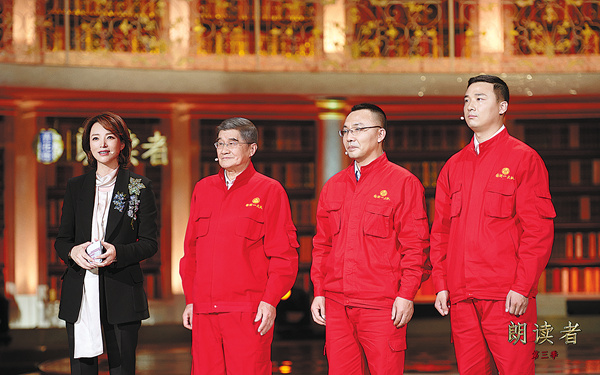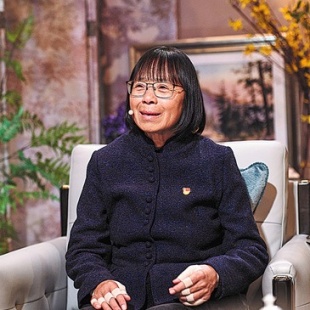Words of wisdom


According to Dong, The Reader should offer a platform to not only masters and elites "standing on the tips of pyramids", but also people who are "down-to-earth", because the stories of ordinary people reflect the pulse of the era across wider dimensions.
One such example, which demonstrates this mindset, is perhaps Zhang Guimei, a woman who has spent decades at the front line of education in poverty-stricken regions. She has established a free high school for girls who were on the verge of dropping out of the education system due to poverty, prolonging their dreams and fueling their potential.
Zhang reads one of her own compositions that expresses her determination in her educational career and regret at not being able to spend time with her parents.
"In this new season, we'd like to better reflect the era we're in," Dong says. "What the guests read demonstrates their care for society and deep thoughts on life.
"By inviting representatives of people from various fields, we can see how they love life and work hard to move forward," she explains. "They explore the unknown with courage and find strength in difficulty. Their stories, mixing laughter and tears, will resonate with the audience."
In the previous two seasons of The Reader, key words like "nostalgia", "youth" and "gift" were set for each episode. However, in the current season, these inspirational words become questions like "Can we change the world?" or "Which choice would you change if you got a second chance?"
"Each episode is an open-ended discussion," Dong explains. "There's no standard answer, but we want to inspire people to think and sincerely talk with their own hearts."
The show does not always carry such a serious tone of meditation and philosophical thinking.
By inviting Wu Lei, China's top soccer star, currently plying his trade with Spanish club RCD Espanyol, to take part in an upcoming episode, producers are looking to not only attract younger viewers, but also inject a sense of energy.
However, some may be surprised by his choice of material, as Dong reveals that the player will read an excerpt from Wukong, an online novel based on the classic Ming Dynasty (1368-1644) novel Journey to the West.
As the show's host says, Wu's journey across the fields of European soccer perfectly match the stories of Sun Wukong-the Monkey King-who pursues his lofty dreams westward.
Wang Yichuan, a professor of art theory at Beijing Normal University, observes that the third season of The Reader reflects a wider spectrum of literature by including more abundant genres of writing in the show.
For example, A Brief History Of Time, the magnum opus of late theoretical physicist Stephen Hawking, and The Importance of Living, a philosophical book by late Chinese linguistics master Lin Yutang, are also chosen for the program.
"We can see that this program is no longer satisfied with simply showing beauty of language," Wang says. "We can also see an exchange among humanities. When literature is given a broader definition, it can reach out to much wider spaces in people's lives."
Xia Chao, head of China Literature and Art Critics Association, also sees The Reader as enlightening the public's sense of aesthetics.
"It not only offers audiences psychological strength, but also encourages people to observe beauty within an insightful mind, which is needed in our new era," he says.
"People's stories are varied and their experiences are colorful," Yan Jingming, vice-president of China Writers' Association, says. "However, there is a shared theme among them-their love for their country and home. With that clue, producers can further display their creativity to keep improving the show in the future."





































